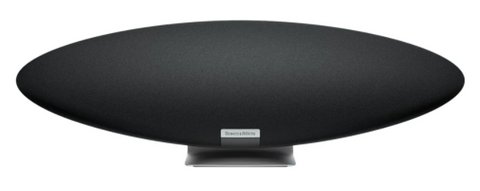
Wireless connection has become the standard in today's audio world. When it comes to listening to your music at home, you can now pick between Bluetooth or Wi-Fi. While Bluetooth was once the most reliable method of wireless connection to an audio receiver or speakers, traditional Wi-Fi has recently become a popular method of audio transfer.
What are the differences between these two transmission methods? Which option should you choose to listen to your music at home? The experts at Fillion Électronique explain which technology you should use!
Bluetooth vs Wi-Fi audio: what are the signal differences?
Bluetooth works by transmitting data directly between the source and receiver via radio waves. Playing a song on a Bluetooth speaker involves taking the audio file on your mobile device, compressing it, and sending it to your speaker over a narrow bandwidth.
Wi-Fi systems rely on your home wireless network as they connect to your router to send the audio signal from your device to your speakers using a special protocol (AirPlay is a good example of a Wi-Fi protocol used to transmit audio and even video signals). While your smart devices control your speakers, the music is sent from your music collection or streamed over the Internet. This means that phone calls or other applications don't interrupt your music playback.
Devialet's Phantom II 98Db features AirPlay 2 technology for easier use!
There is no right or wrong answer when it comes to Bluetooth or Wi-Fi audio signal, it all depends on what you are looking for when it comes to music.
Is sound quality your priority? Choose a Wi-Fi speaker
The main issue for many music lovers searching for a wireless speaker for their homes is sound quality. Wi-Fi speakers perform better than Bluetooth speakers here.
Bluetooth compresses audio files more (often already compressed on streaming platforms) due to the limited bandwidth availability. Though there is a high definition (HD) version of Bluetooth, only some devices support this new technology.
Wi-FI has a much higher bandwidth than Bluetooth, allowing it to broadcast lossless audio streams. This means that all the data coming out of the audio source is received by the speaker.This allowsWi-Fi speakers to play high-resolution files. Sonos and Bluesound speakers use this technology.
More and more Wi-Fi speakers feature Google's voice assistants, increasing their usability even more. A good example is BeoSound9 by Bang & Olufsen.
Looking for portability? Bluetooth is the winner
Portable Bluetooth speakers use a low-speed data transmission method that can affect the sound quality, yet it makes them easier to use in any environment.
While many Wi-Fi speakers are just as small as their Bluetooth equivalents, they still require a wireless network to connect to a mobile device.
You should choose a Wi-Fi speaker if you are looking for a home audio system. If you're looking for something practical, portable, and versatile, go for a Bluetooth speaker. This trades off some sound quality for greater flexibility.
This Sonos Move speakeris easy to carry around and compatible with both Wi-Fi and Bluetooth!
Want to create a multi-room system? Choose Wi-Fi
Bluetooth originally was a point-to-point system, using one device at a time for a single speaker. This is still the case for many products. Some progress has been made, but it is often product-specific and involves using additional applications.
Using Wi-Fi, the number of speakers or sources connected to a network is limited only by the number of available IP addresses. MultiRoom Audio Wi-Fi systems can play different songs in different rooms or play the same music across all rooms. You control the volume or music playlists from any part of your home.
The Sonos One (Gen 2) speaker can be paired with other Sonos speakers for a complete home sound experience!
You can create a truly immersive in-home sound environment with audio that's superior to Bluetooth.
Bluetooth vs Wi-Fi: Find the best of both technologies at Fillion Électronique
The Bluetooth vs. Wi-Fi question isn't simple. Both technologies have their advantages and disadvantages.
You should know that most wireless speaker manufacturers integrate both technologies into their products. At Fillion Électronique, you will find all the speakers you need: Bowers & Wilkins, Bluesound, Devialet, Naim, Technics, Yamaha. Feel free to contact our experts or visit us in our Montreal store!











